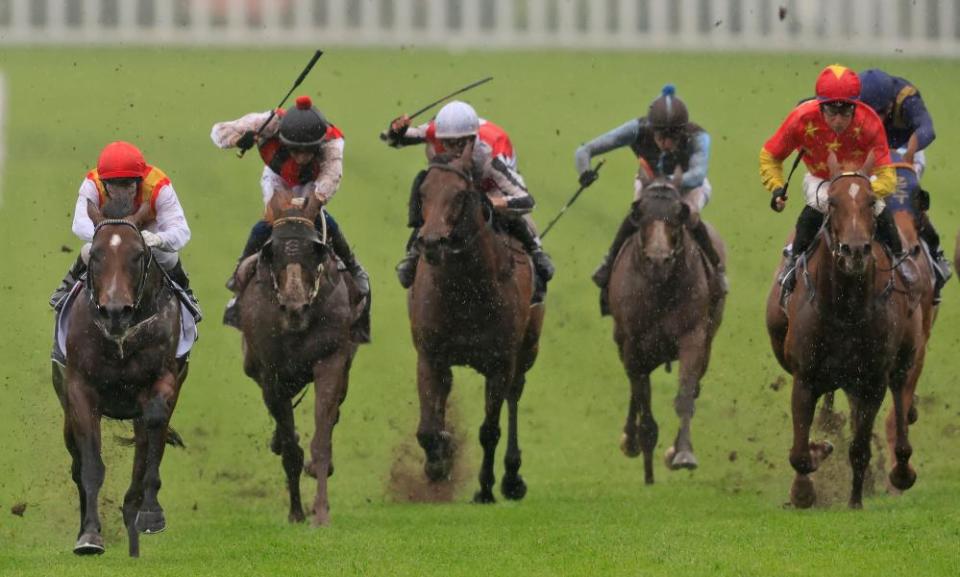Jockeys get no benefit from using a whip in horse racing, landmark study finds

There is no benefit to jockeys using a whip in horse racing, according to a world-first study that found there was no difference in race times and rider safety between races where whipping is permitted and apprentice races that ban the use of whips.
The study is a boon to Racing Victoria, which is calling for whips to be phased out. It is seeking a vote at Racing Australia next month to introduce new rules that, if adopted, would limit the number of times a rider was allowed to whip their horse per race.
The proposed reform would bring Australia into line with the United Kingdom, Ireland, Germany, France and parts of the United States. But it is opposed by Racing New South Wales, with its chief executive, Peter V’landys, accusing the Victorian association of “grandstanding” for “cheap publicity”.
Related: Five ways to make horse racing more humane right now
The study, led by the University of South Australia’s Dr Kirrilly Thompson and co-authored by RSPCA Australia’s Paul McGreevy, examined the stewards reports from 126 races in the UK, including 67 “hands and heels” races ridden by apprentice jockeys who are allowed to carry, but not use, the whip.
All of the races were run on the same track and whip-free races were matched by track conditions, field size and race class with a whipping permitted race. The stewards reports were then analysed for movement on course, interference and jockey behaviour.
“And lo and behold we found there was no statistically significant difference. In short, what that tells us is that whipping doesn’t work,” Thompson said. “At least, whipping doesn’t work for the things that we thought it did.”
The racing industry has long argued that whips are necessary as a safety aid, because they can help a jockey with steering. There is also a belief – both in the racing community and among punters – that they make horses run faster.
“We looked at the finishing times of the races and there was no statistically significant difference there either,” Thompson said. “So really we can’t find anything to recommend the use of whips.”
Thompson said the research should reassure punters who were concerned that by not using the whip riders were not getting the best possible performance out of a horse.
“Hands and heels” races are a fixture in the UK, and a rule limiting the use of the whip on flat and jumps races was introduced in 2011. Whip use was also prohibited for senior jockeys in the new £1.8m Racing League, which launched this year.
Thompson said comparing “hands and heels” races to regular races was the closest researchers could get to performing a blind experiment on whip use. She said the results should translate to Australia but that if Racing Australia were to introduce whip-free races for apprentices, a similar study could be conducted here.
The RSPCA has also backed the introduction of hands and heels races.
The changes proposed by Racing Victoria are that, from 1 January, jockeys would only be allowed to use the whip on a maximum number of occasions – between five and eight – throughout the entire race and never in consecutive strides. Jockeys would be allowed to continue to carry the whip but they should only be used when necessary to protect the safety of horses and riders.
Related: Whips to be banned in this summer's £1.8m Racing League
The Australian Rules of Racing currently permit riders to use the whip a maximum of five times on non-consecutive strides throughout most of the race, but for the final 100 metres the limit is lifted to “at the riders’ discretion”.
In a public statement in September, Racing Victoria said “the current national whip rules are no longer appropriate and not in the best interests of Victorian and Australian racing, both now and in the long-term”. It said racing in Australia was lagging behind international standards, and risked alienating its audience.
“Making progress on whip reform is important if we want to retain our existing audiences and ensure that we’re an attractive option for the fans and employees of tomorrow,” the Racing Victoria CEO, Giles Thompson, said.
But the proposed rule change seems unlikely to gain national support. Under Racing Australia’s rules, any change of rules requires a national consensus. Racing Victoria has indicated it will look at going it alone if the reform is not passed.
V’landys criticised Racing Victoria for making its position public ahead of the meeting, telling Racenet that NSW was not interested in a public debate.
“They can grandstand and look for cheap publicity all they like, but we’ll follow proper corporate governance and express ourselves at the meeting like they should be,” he said.
The RSPCA Australia chief scientist, Dr Bidda Jones, said the public no longer supported the use of whips. A poll commissioned by RSPCA Victoria found that 69% of Victorians think horses should not be whipped in the normal course of the race, and 71% who do attend racing and place bets would continue to do so if whips were banned.
“Now we know that not only are whips unpopular, they’re also unnecessary as they don’t appear to affect the actual race,” Jones said. “In other words, the whip can no longer be defended as a tool for racing speed, integrity or safety.”

 Yahoo News
Yahoo News 